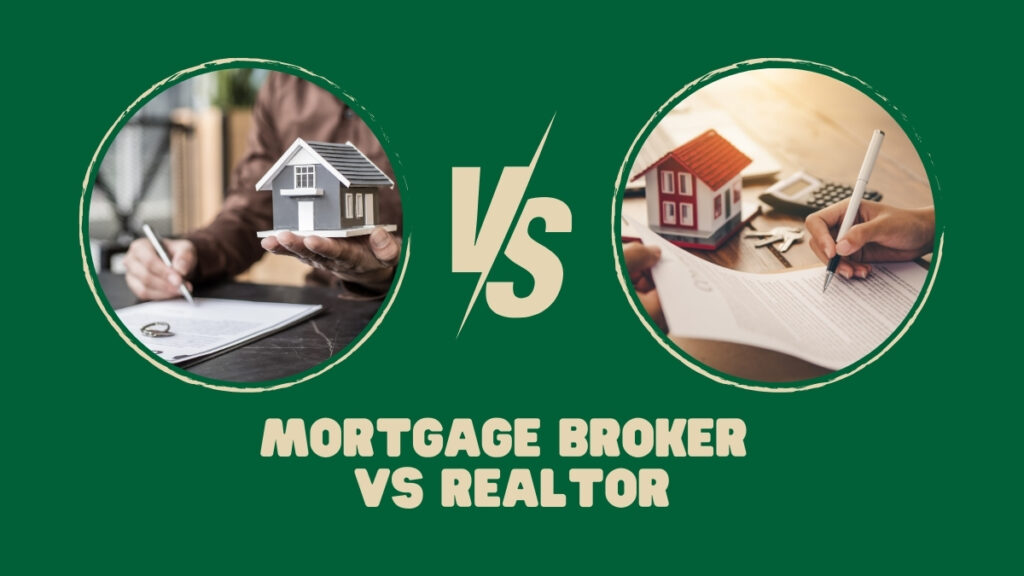Mortgage broker vs realtor is a common point of confusion, especially for first-time buyers. Nearly half of Canadian homebuyers now work with a mortgage broker while nine in ten work with a realtor.
Yet many still aren’t sure which professional to call first. Consider Sarah. She fell in love with a listing and hired a realtor, assuming that person would also secure her financing.
It was only after her offer was accepted that she learned she still needed a mortgage broker to shop rates, delaying her closing by weeks.
Choosing the right professional at the right time can affect your interest rate, down payment amount, closing date and overall stress level.
A mortgage broker’s wide lender network can save you thousands in interest over the life of your mortgage. A realtor’s local market insight can help you negotiate a lower purchase price and avoid costly inspection surprises.
This article will define mortgage brokers and realtors, compare their services, fees and regulations, explain when to engage each and show how they work together.
By the end, you will have a clear understanding of the mortgage broker vs realtor relationship and know exactly whom to call, when to call them and how to get the most value from each.
Mortgage Broker vs Realtor
Buying a home? One helps you find it, the other helps you fund it. Let’s break down mortgage broker vs realtor and who you really need first.
Definitions & Core Roles
Mortgage broker vs realtor sounds simple, but their roles are often misunderstood. Let’s clear up who does what so you can make the right move.
Mortgage Broker
A mortgage broker is a provincially licensed intermediary who finds the lender and mortgage product that best fits your needs. Core services include:
Shopping your mortgage application across banks, credit unions and monoline lenders
Negotiating rates and structuring fixed, variable and hybrid mortgages
Managing the application process, collecting documents and following up with lenders to ensure timely approval
Realtor
A realtor is a licensed real estate sales professional and member of the Canadian Real Estate Association. Core services include:
Conducting a detailed market analysis to identify properties that meet your budget and needs
Coordinating listing and marketing including professional photography, staging and virtual tours
Preparing offers, negotiating on your behalf and guiding the transaction from accepted offer to closing with inspectors, lawyers and movers
Education, Licensing & Regulation
Mortgage brokers and realtors may seem similar, but the paths to becoming one are very different. Here’s what it takes to earn the title.
Mortgage Broker
Completes provincial education courses and licensing exams (for example through FSRA in Ontario or BCFSA in British Columbia)
Regulated by provincial bodies with mandatory disclosure rules and ethics codes
Maintains compliance through annual renewals and ongoing continuing education
Realtor
Finishes pre-licensing courses and passes a national exam administered by the provincial real estate council (for example RECO in Ontario)
Joins CREA and abides by the REALTOR® Code of Ethics
Completes mandatory professional development each year to keep skills and knowledge up to date
Scope of Services Compared
From rate shopping to house hunting, mortgage brokers and realtors offer very different services. Here’s how their roles stack up.
Mortgage Broker Services
Pre-approval guidance to show sellers you are a serious buyer and set realistic budgets
Rate and product comparison across retail banks, credit unions and monoline lenders
Support with complex financing such as home equity lines of credit, refinancing, commercial mortgages and self employed income underwriting
Submission of documents, lender follow-up and coordination of fund disbursement for closing day
Realtor Services
Comparative market analysis using recent sales data to set offer or listing price
Property marketing via MLS listings, open houses and targeted digital campaigns
Arranging showings, representing buyer interests in negotiations and handling multiple offer scenarios
Coordinating property inspections, legal review and moving logistics
Compensation Models
Ever wonder how mortgage brokers and realtors get paid? Knowing their compensation can help you understand where their priorities lie.
Mortgage Broker Fees
Most brokers are paid a commission by the lender built into your mortgage rate. Some offer a borrower-paid model, charging either a flat fee (typically between $250 and $1,200) or a percentage of the mortgage amount (usually 0.5 percent to 1.2 percent). Always ask for a clear fee schedule in writing.
Realtor Commissions
Realtor commissions generally range from 3 percent to 5 percent of the sale price and are split between listing and buyer agents.
The seller pays this fee out of the sale proceeds so buyers rarely pay directly at closing. Commission rates can be negotiated in some markets.
Pros & Cons
Both mortgage brokers and realtors have their strengths and limitations. Here’s a quick look at the pros and cons of working with each.
Mortgage Broker
Pros
Access to a wide panel of lenders and products
Potential for lower rates and flexible mortgage structuring
Single point of contact for financing questions
Cons
Cannot advise you on property value or neighbourhood suitability
Some brokers may have hidden fees if disclosures are not clear
Realtor
Pros
In-depth local market expertise and pricing strategy
Skilled negotiation on price, conditions and closing dates
Full transaction management from offer to closing
Cons
Commission costs baked into sale price
Quality varies widely so due diligence is essential
When to Engage Each Professional
Timing matters. Knowing when to call a mortgage broker and when to call a realtor can save you time, money and stress.
Mortgage Broker Only
You plan to refinance or renew your existing mortgage
You need financing for an investment property or commercial purchase
You have self employed income or other complex underwriting requirements
Realtor Only
You are selling a property without buying at the same time
You are purchasing vacant land or a new-build with builder financing already in place
Both Together
Typical home purchase begins with a broker pre-approval followed by property search with a realtor
Realtor writes an offer with a financing condition timed to match the broker’s rate hold
How They Work Together?
Mortgage brokers and realtors are not rivals. They’re a team that helps guide you from pre-approval to closing. Here’s how they work together.
Referrals and Introductions
Most realtors will refer you to a trusted broker for pre-approval. A broker’s proof of financing can make your offer more competitive.
Coordination of Timelines
Your realtor and broker should align the mortgage commitment date with the closing date. If financing terms change, your realtor can adjust the offer conditions to protect you.
Joint Negotiation Strategies
Presenting a strong pre-approval helps negotiate a lower purchase price and faster closing. A broker’s rate hold ensures financing is secured before you are locked into the deal.
Questions to Ask Before You Hire
The right questions can save you from costly surprises. Here’s what to ask a mortgage broker or realtor before you commit.
Mortgage Broker
How many lenders are on your panel and which types of products do you offer
What fees do you charge, when are they due and how are they disclosed
How will you keep me updated on my application status
Realtor
What is your recent sales record in my target neighbourhood
What marketing plan will you use for my purchase or sale
How do you handle multiple offers and bidding wars in a hot market
Cost Comparison Example
Not all costs are upfront. Here’s a simple example to show how choosing a mortgage broker or realtor can impact your bottom line.
Scenario: $500 000 Home Purchase
Broker commission at 0.25 percent built into rate → approximately $1 250 (paid by lender)
Broker flat fee if applicable → $1 000 (paid by borrower)
Realtor commission at 4 percent → $20 000 (paid from sale proceeds)
All-In Cost Breakdown
| Cost Component | Amount | Who Pays |
| Broker commission in rate (0.25 percent) | $1 250 | Lender / borrower |
| Broker flat fee | $1 000 | Borrower |
| Realtor commission (4 percent) | $20 000 | Seller proceeds |
| Total incremental cost | $22 250 | Mixed |
Tips for Maximizing Value
Get the most from your mortgage broker and realtor by knowing how to work with them, not just hire them. These tips can help you do exactly that.
For Mortgage Broker Engagement
Obtain multiple quotes from different brokers and lenders to compare net rates
Request a full fee disclosure in writing before you commit
Compare the effective interest rate after factoring in any broker commission
For Realtor Engagement
Check agent references and read past client reviews online
Ask for a written marketing and communication plan detailing how often you will hear from them
Negotiate commission structure where possible, for example capped fees for high value homes
Common Misconceptions
People often mix up what realtors and mortgage brokers do. Let’s bust three big myths:
Your realtor can get your mortgage
They help you find a home but they can’t secure your loan. Only a mortgage broker or a lender can do that. Talk to a broker early so you don’t miss out on better rates or delay your closing.
Brokers only work with bad credit
Not true. Brokers help everyone. Even if your credit is great they can shop multiple lenders to find you a better deal than your bank.
One person should handle both your home search and your mortgage
You might think one pro can do it all. Most experts focus on one role. It’s wiser to work with two specialists so you get the best advice on your home and your financing.
Emerging Trends & Future Outlook
The real estate and mortgage world is changing fast. Here’s what’s ahead for brokers, realtors and the homebuyers they serve.
Digital Mortgage Platforms vs Traditional Brokers
Online comparison tools and robo-brokerage sites now offer instant rate quotes. Some charge subscription-based flat fees rather than commission spreads.
Virtual Realtors and iBuyers
Technology firms now make instant cash offers on homes and provide limited service realty at reduced commission rates.
Regulatory Changes on Fees and Disclosure
Proposed rules under Ontario’s FSRA and Quebec’s AMF call for tighter caps on broker commission spreads and more transparent disclosure of all compensation.
Conclusion
Mortgage broker or realtor? Now you know the difference, when to call each and how to get the most out of both. Your next move just got easier.
Mortgage brokers and realtors serve distinct but complementary roles. Brokers excel at finding the best financing solution, while realtors guide you through the property search and negotiation process. For most home purchases, begin with a broker pre-approval and then partner with a realtor to find and secure your dream home.
Ready to start? Get in touch with our mortgage experts or get a free consultation over a call at +1 844 354 3033.


